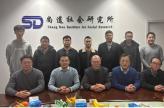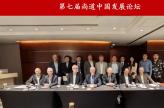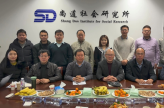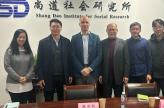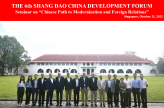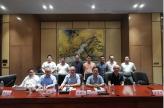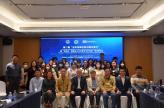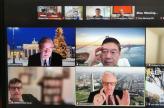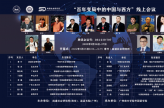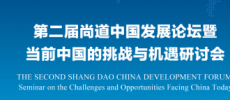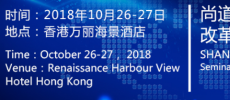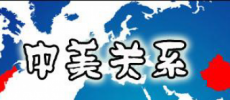第二届尚道中国发展论坛即将举行
更新时间:2019-10-15 11:43:52 | 来源: 尚道社会研究所
|
研讨会议程 |
|
| 会议时间:10月19日08:40至18:00 会议地点:澳门JW万豪酒店第三会议室 |
|
| 10月18日(周五) 15:00以后 参会嘉宾报到,入住澳门JW万豪酒店第三会议室(路氹“澳门银河”综合渡假城) |
|
| 10月19日(周六) | |
| 08:40-08:50 | 研讨会开幕,香港尚道社会研究所所长寒竹致欢迎辞 |
| 上午主题发言(每人30分钟) 主持人:李巍(中国人民大学国际关系学院教授) |
|
| 08:50-09:20 | 沈大伟(乔治·华盛顿大学艾略特国际事务学院教授、中国政策项目主任) 中国外交政策面临的挑战 |
| 09:20-09:50 | 胡伟星(澳门大学社会科学学院教授、院长) 习近平的领导与中国的“大国外交” |
| 09:50-10:20 | 互动讨论 |
| 10:20-10:40 | 茶歇 |
| 10:40-11:10 | 郝福满(新加坡国立大学东亚研究所所长、教授) 中美共同体终结的经济后果 |
| 11:10-11:40 | 寒竹(尚道社会研究所所长、复旦大学中国研究院研究员) 中国经济的持续发展需要进一步改革开放 |
| 11:40-12:10 | 互动讨论 |
| 12:10-13:30 | 午餐(名厨都汇) |
| 下午主题发言(每人30分钟) 主持人:寒竹(尚道社会研究所所长) |
|
| 13:30-14:00 | 欧威廉(哈佛大学肯尼迪政府学院高级研究员) 中国的发展前瞻 |
| 14:00-14:30 | 郝雨凡(香港中文大学(深圳)人文社科学院校长讲席教授,全球研究项目主任) 中美紧张关系对中国外交政策的影响:中国对美政策的可能趋势 |
| 14:30-15:00 | 林丹(香港城市大学亚洲与国际关系研究教授) 全球网络社会对中国政治秩序的威胁 |
| 15:00-15:30 | 互动讨论 |
| 15:30-15:50 | 茶歇 |
| 15:50-16:20 | 李远(德国杜伊斯堡-埃森大学东亚研究所教授) 一带一路:中欧合作与包容性增长的新催化剂 |
| 16:20-16:50 | 李巍(中国人民大学国际关系学院教授) 中美贸易战的大辩论 |
| 16:50-17:20 | 王平(中评社副社长、中评智库理事) 极限对峙:国企为骨,民企为肉 |
| 17:20-17:50 | 互动讨论 |
| 17:50-18:00 | 合影留念 |
| 18:00— | 晚宴(万豪中菜厅) |
|
The Seminar Agenda |
||||
| Time: 08:40-18:00, October 19 Venue: Meeting Room 3, JW Marriott Hotel Macau |
||||
| After Three o’clock afternoon, October 18 Checking into JW Marriott Hotel Macau Address: Galaxy Macau™, Estrada da Baía da Nossa Senhora da Esperanca s/n, COTAI, Taipa Macau, China |
||||
| Saturday morning, October 19 | ||||
| 08:40-08:50 | Welcoming Speeches Michael Wu (Director and Research Fellow, Shang Dao Institute for Social Research) |
|||
| Theme Presentations (30 Minutes/Person) Moderator: Li Wei (Professor of School of International Studies at Renmin University of China) |
||||
| 08:50-09:20 | David L. Shambaugh (Professor and Director of the China Policy Program of Elliott School of International Affairs at George Washington University) Challenges in Chinese Foreign Policy |
|||
| 09:20-09:50 | Hu Weixing(Dean and Professor of Faculty of Social Science at University of Macau) Xi Jinping’s Leadership and China’s “Major Country Diplomacy” |
|||
| 09:50-10:20 | Question and Answer Session | |||
| 10:20-10:40 | Coffee Break | |||
| 10:40-11:10 | Bert Hofman (Director and Professor of the East Asian Institute (EAI) at the National University of Singapore) The Economic Consequences of the End of Chimerica |
|||
| 11:10-11:40 | Michael Wu (Director, Shang Dao Institute for Social Research; Research Fellow of China Institute at Fudan University) The Sustainable Development of China’s Economy Needs Further Reform and Opening-up |
|||
| 11:40-12:10 | Question and Answer Session | |||
| 12:10-13:30 | Lunch(Urban Kitchen) | |||
| Saturday afternoon, October 19 | ||||
| Theme Presentations (30 Minutes/Person) Moderator: Michael Wu (Director and Research Fellow, Shang Dao Institute for Social Research) |
||||
| 13:30-14:00 | William H. Overholt (Senior Research Fellow of Harvard’s Kennedy School) China’s Development Prospects |
|||
| 14:00-14:30 | Hao Yufan (Director of Global Studies Program and Presidential Chair Professor at the Chinese University of Hong Kong, Shenzhen) Impact of Sino-American Tension on Chinese foreign policy: Possible Trend of China’s American Policy Making |
|||
| 14:30-15:00 | Daniel C. Lynch (Professor of Department of Asian and International Studies at City University of Hong Kong) The Globally-Linked Network Society as a Threat to the Chinese Political Order |
|||
| 15:00-15:30 | Question and Answer Session | |||
| 15:30-15:50 | Coffee Break | |||
| 15:50-16:20 | Li Yuan (Professor of Institute of East Asian Studies at University of Duisburg-Essen) The BRI: A New Catalyst for Inclusive Growth and Cooperation Between China and Europe |
|||
| 16:20-16:50 | Li Wei (Professor of School of International Studies at Renmin University of China) Debating China-US Trade War |
|||
| 16:50-17:20 | Wang Ping(Deputy President and Board Member of China Review News Agency) Extreme Confrontation: State-owned Enterprises as bones, Private Enterprises as the meat |
|||
| 17:20-17:50 | Question and Answer Session | |||
| 17:50-18:00 | Group Photo Session | |||
| 18:00- | Dinner (Man Ho Chinese Restaurant) | |||
| 列席嘉宾(Other Attendees) | ||||
| 1 | 廖建明 Liu Kin-ming |
香港前媒体人士、现为公共事务顾问 Former Senior Media Staff of Hong Kong; Public Affairs Consultant |
||
| 2 | 甘文锋 Kam Man-fung |
香港屯门区区议员 Elected Member of Tuen Mun District Council, Hong Kong |
||
| 3 | 孟维瞻 Meng Weizhan |
复旦大学中国研究院助理研究员 Assistant Research Professor of China Institute at Fudan University |
||
| 4 | 张佩琪 Cheung Pui Ki |
香港畅学教育有限公司 Happy Coding Company Ltd,. |
||
| 5 | 辛格 Xin Ge |
上海财经大学公共经济与管理学院助理教授 Assistant Professor of School of Public Economics and Administration of Shanghai University of Finance and Economics |
||
议题:第二届尚道中国发展论坛暨“当前中国的挑战与机遇”
目前,中国经济社会发展正进入一个关键时期。根据国家统计局数据显示,2019年第一季度,中国经济同比增长6.4%,拉动经济增长的投资、出口和消费等数据均维持在了合理区间。然而,在看似稳定向好的局面背后,中国社会的发展仍然潜藏了不少隐忧。根据中国政府的数据,2019年以来社会消费品零售总额同比增速出现回落,4月份的出口总额同比下降2.7%。随着中美贸易谈判陷入困境,人们开始质疑中国的出口增速还能否持续?此外,中国的市场经济能否在进一步的改革中完善?不同所有制企业间的“竞争中性原则”能否真正实现?国有企业改革能否顺利推进?民营企业在市场竞争中能否获得公平待遇?这些国内经济问题均引起了人们的关注。
另一方面,在经历了四十年的改革开放后,中国经济发展的国际环境发生了根本性的变化。当前,世界经济结构正处于大调整时期,全球产业链正发生新的转移。东南亚的制造业正在第二次兴起,已经在承接从中国转移出的产业链。这意味着中国过去几十年经济快速发展的要素成本优势、与全球化相关的国际分工和后发学习优势等出现递减甚至消失,也意味着中国长期保持的充分就业可能会受到挑战。中国如何在全球产业链的变化中维持稳定的发展?中国的经济发展能否从劳动密集型的增长升级为知识密集型?这关系到维持了40年高速增长的中国经济在未来能够持续发展。
上述中国内外形势的变化表明,中国经济持续增长的不确定性因素和各种外部风险不断增加,未来中国经济社会发展或将遭受更大的挑战。但是,中国面临的这些内外部问题,既是严峻的挑战,同时也为下一步深化改革孕育了机遇。如果中国能正面、理性、积极地回应这些挑战,那么很有可能再一次实现历史性的跨越。正是在这种形势下,尚道社会研究所特别邀请国内外嘉宾围绕中国经济的现状与未来共同讨论以下问题:
1.新的国际环境的变化能否促进中国改革的进一步深化?
2.中国要维持中高速的经济增长,需要进行哪些层面的调整?
3.在国际格局发生重要变化的时刻,中国应当如何定位自己,维持与西方国家良性互动的关系?
4.在企业发展层面,中国能否真正做到“所有制中立”?国有企业能否真正作为独立的经济实体参与市场竞争?中国如何调动民营企业家的热情,促进国有企业和民营企业共同发展?
5.在全球化时代,中国还能否在高科技领域中与发达国家维持商业合作?
THE SECOND SHANG DAO CHINA DEVELOPMENT FORUM
Seminar on the Challenges and Opportunities Facing China Today
Seminar on the Challenges and Opportunities Facing China Today
China's economic and social development is now entering a critical period. China's economy grew 6.4% year-on-year in the first quarter of 2019, according to the National Bureau of Statistics of China. Data on investment, exports and consumption, which are driving economic growth, remain within a reasonable range. However, although the current situation seems stable and positive, the development of Chinese society still has many hidden dangers. According to the government, the total retail sales of consumer goods have started to slow year-on-year since 2019, and the total exports dropped 2.7% year-on-year in April. With the Sino-US trade negotiations getting into some trouble, it is widely concerned whether China's total exports can be able to continue to grow steadily in the future. Besides, can China's market economy gradually improve through further reform? Can the principle of “competitive neutrality” between enterprises with different ownership be truly guaranteed? Can the government successfully push for reform of state-owned enterprises? Can private enterprises be treated fairly in the market competition? These economic problems are receiving more and more attention.
Furthermore, after 40 years of reform and opening-up, the international environment for China's economic development has changed radically. At present, the world economic structure is in a period of great adjustment; the global industrial chain has changed again. Manufacturing in Southeast Asia is on the rise for the second time, and part of China's manufacturing sector is moving to Southeast Asia. This means that the advantages of cheap labor, which have driven China's rapid economic growth over the past few decades, the structure of international division of labor in favor of China and China's late-mover advantage of learning from the western developed countries are all beginning to decline or even disappear. Thus, it may be difficult for China to maintain a long-term higher employment rate. How can China maintain a steady rate of development during the sharp change of the global industrial chain? Can China's economic development be transformed from a labor-intensive growth model to a knowledge-intensive one? The answers to these questions will determine whether China's economy, which has been growing rapidly for 40 years, will continue to grow in the future.
These changes in the domestic and international situation indicate that the uncertainties of China's economic growth and that various external risks are increasing. They also suggest that China's economic and social development may face greater challenges in the future. Nevertheless, these internal and external problems represent both a serious challenge for China and opportunities for further reform. If China can respond positively and rationally to these challenges, it is likely to make another historic leap. Therefore, the Shang Dao Institute for Social Research invites guests from China and other countries to discuss the status and the future of China's economy while addressing the following questions:
1. Can new changes in the international environment further deepen China's reform?
2. What kinds of reform and adjustment are needed to sustain China's medium-and high-speed economic growth?
3. At a time of significant change in international relations, how should China position itself and maintain its benign interaction with the West?
4. As far as enterprise development is concerned, Can the principle of “ownership neutrality” among enterprises be truly guaranteed? Will state-owned companies really give up their privileges and compete fairly with private companies? How can the Chinese government stimulate the enthusiasm of private entrepreneurs and promote the common development of state-owned enterprises and private enterprises?
5. Can China continue to maintain commercial cooperation with developed countries in the high-tech sector?
Working Language: English and Chinese
Host and Organizer: Shang Dao Institute for Social Research,Hong Kong


